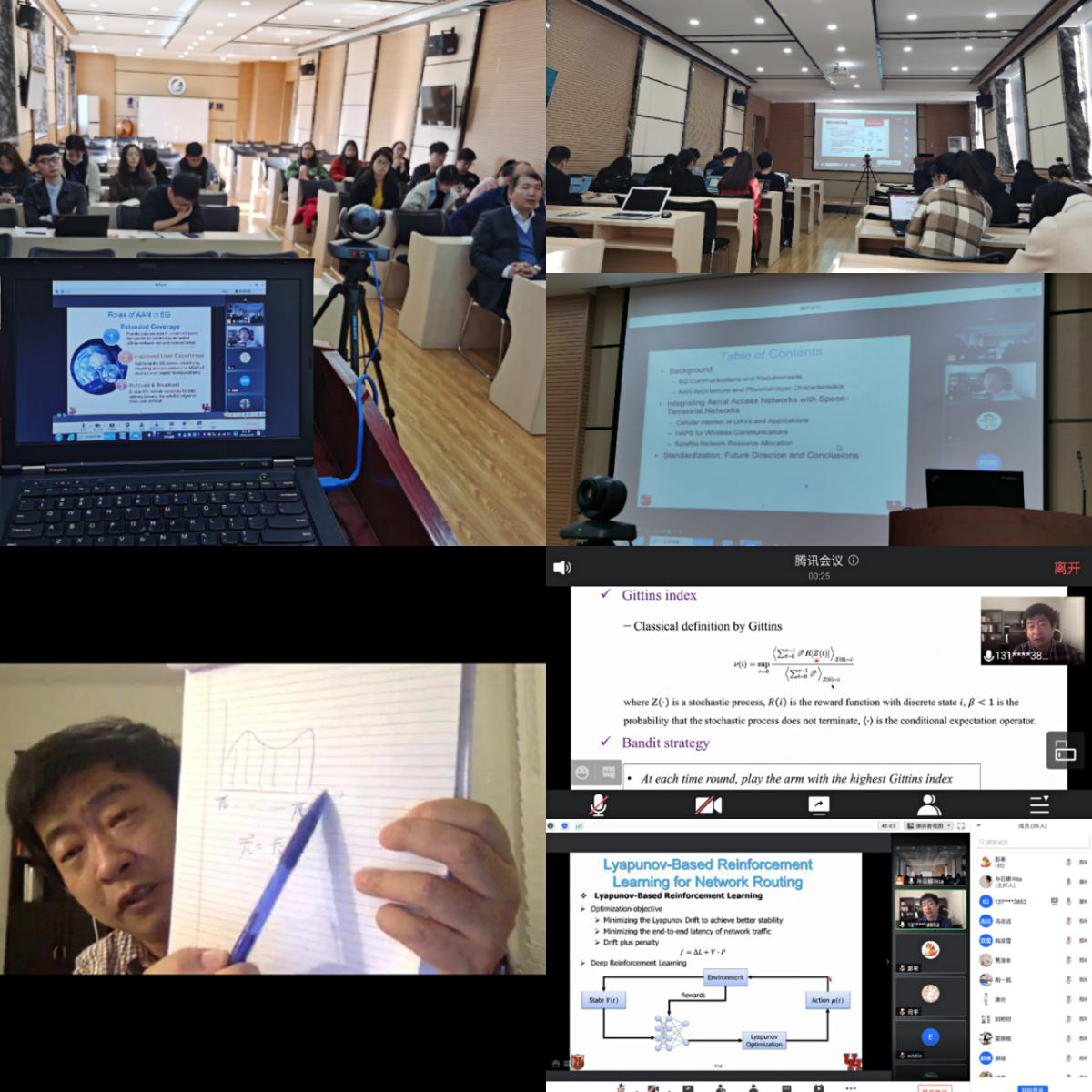From October 26 to 31, 2020, Professor Zhu Han engaged in six-day online academic activities with teachers and students at College of Communication Engineering. The lectures were chaired by Professor Hu Fengye. Via online and offline channel, over 300 teachers and students participated these academic activities.
Themed on five topics, Professor Zhu Han made six academic reports on “Aerial Access Networks for 6G: From UAV, HAP, to Satellite Communication Networks”, “Reconfigurable Intelligent Surface for 6G: Communication, Sensing, and Localization”, “Modern Delay Analysis for Networking:from MCMC, Martingale to Stochastic Network Calculus, Lyapunov and Age of Information”, “Federated Learning Tutorial” and “Multi-Armed Bandits Its Application in Wireless Networking”.
Professor Zhu Han started his lecture by explaining some basic knowledge about aerial access networks and pointed out the the application and challenges of aerial and terrestrial wireless communications systems. He then introduced high-speed data services based on Reconfigurable Intelligent Surface (RIS) and highlighted the unique functions of RIS through a comparison with the traditional antenna array. In-depth discussion was also made on how RIS support communications and its typical application.
Then, Professor Zhu Han introduced two novel programs of delay analysis for networking as alternatives traditional Queuing Theory, to which Markov Chain Monte Carlo (MCMC), Lyapunov Stability and Age of Information (AOI) were applied. According to the research, these two programs can provide latency analysis and system stability on a more accurate basis. In order to solve the problem of delay brought by cloud server, Professor Zhu Han proposed Mobile Edge Computing (MEC) and based on MEC, the concept of joint learning was introduced and related simulation results were presented.
At last, Professor Zhu Han elaborated on the basic model of and solutions to Multi-Armed Bandit (MAB) and fully presented how they can be used in solving real problems with multiple algorithms as examples. He also made some conclusions on that and pointed out the limitation of existing studies and forecast its future development.
The brilliant reports on wireless communication systems made by Professor Zhu Han received warm discussions. Conducted synchronously both online and offline, the meetings also became a platform for teachers and students to ask questions. Professor Zhu Han answered all the questions patiently. These online academic meetings not only expand students’ horizon in wireless communications, but also make them aware of cutting-edge technology and research methods.
Bio: Zhu Han received the B.S. degree in electronic engineering from Tsinghua University, in 1997, and the M.S. and Ph.D. degrees in electrical engineering from the University of Maryland, College Park, in 1999 and 2003, respectively. From 2000 to 2002, he was an R&D Engineer of JDSU, Germantown, Maryland. From 2003 to 2006, he was a Research Associate at the University of Maryland. From 2006 to 2008, he was an assistant professor in Boise State University, Idaho. Currently, he is a John and Rebecca Moores Professor in Electrical and Computer Engineering Department as well as Computer Science Department at University of Houston, Texas. His research interests include security, wireless resource allocation and management, wireless communication and networking, game theory, and wireless multimedia. Dr. Han is an NSF CAREER award recipient 2010. Dr. Han has several IEEE conference best paper awards, and winner of 2011 IEEE Fred W. Ellersick Prize, 2015 EURASIP Best Paper Award for the Journal on Advances in Signal Processing and 2016 IEEE Leonard G. Abraham Prize in the field of Communication Systems (Best Paper Award for IEEE Journal on Selected Areas on Communications). Dr. Han is the winner 2021 IEEE Kiyo Tomiyasu Award. He has been IEEE fellow since 2014, AAAS fellow since 2020 and IEEE Distinguished Lecturer from 2015 to 2018. Dr. Han is 1% highly cited researcher according to Web of Science since 2017.
